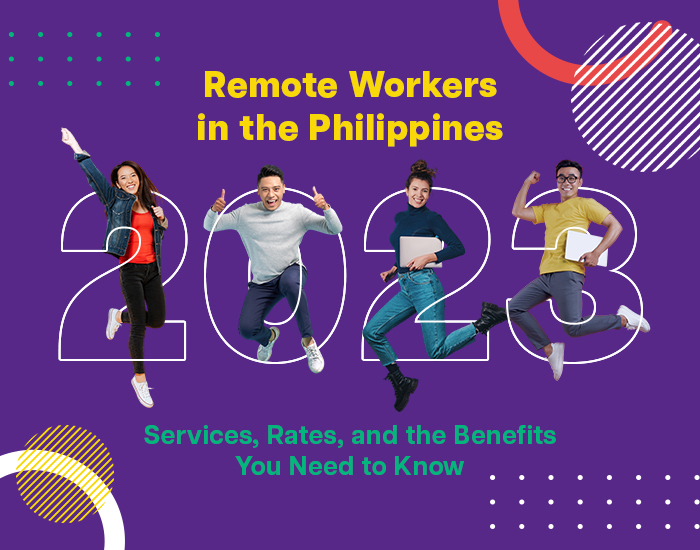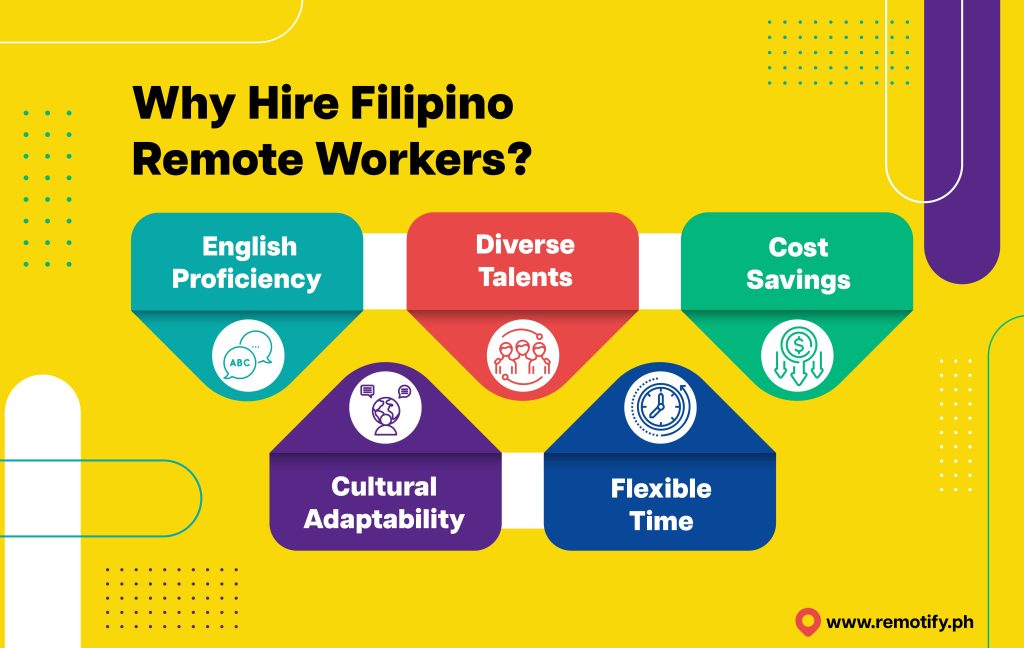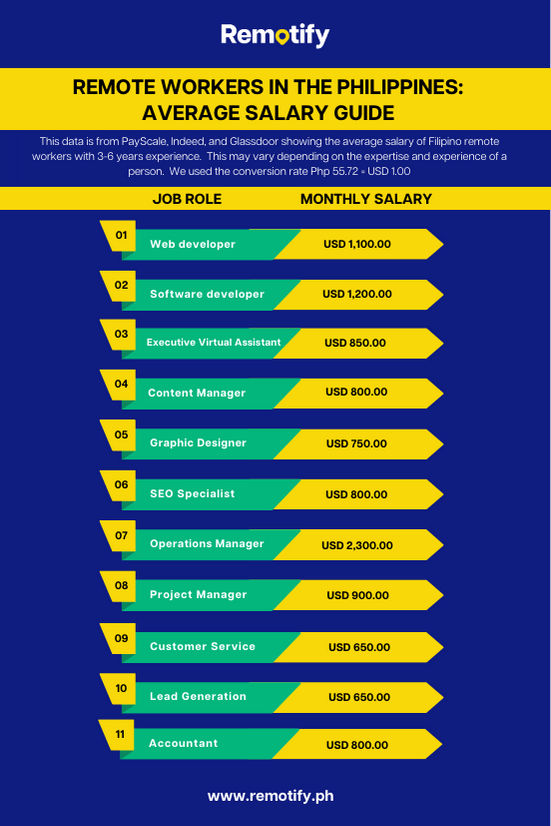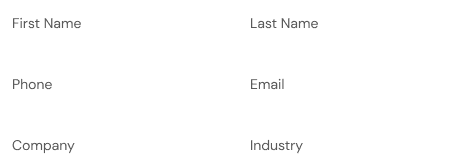
Remote Workers in the Philippines 2023: Services, Rates, and the Benefits You Need to Know
As one of the leading outsourcing destinations globally for talented and skilled professionals, it is no wonder that a lot of offshore companies show their interest in the Philippines when looking to hire remote employees. For decades, many companies have set up satellite offices in the Philippines, or have engaged with outsourcing companies such as EORs or Employer of Record to help scale their team cost-effectively.
In our previous blog, we talked about the benefits of remote working and why you should consider completely transitioning your workplace into a digital one where applicable. But, in this blog, we will focus on how can you hire remote staff, why should you outsource in the Philippines, and what is the range of services that you could outsource in the Philippines.
How to Hire Remote Staff in the Philippines
Hiring remote staff in the Philippines is a straightforward process that can be accomplished using various effective methods. You can utilize an Employer of Record, a specialized firm that handles employment formalities on your behalf. Alternatively, you could establish your own legal entity in the Philippines. Another option is to pay workers as contractors. Lastly, you might consider a Business Process Outsourcing (BPO) company, which can provide a comprehensive workforce solution.
- Employer of Record (EOR): This is the simplest and quickest way. An EOR handles all legal, HR, and administrative tasks, freeing you from these burdens. With an EOR, you can start right away!
- Setting up a Legal Entity: This is more complex. You'll need to establish a business in the Philippines, which can be time-consuming and costly.
- Paying Workers as Contractors: Here, you hire workers directly. It's cheaper, but also brings more responsibilities.
Among these, EOR stands out as the best choice. It's hassle-free, fast, and keeps you compliant with local laws.
Why hire Filipino remote workers?

Filipinos are well-known in the offshore industry and were even placed second in Tholons 2019 Globalization Index. Companies from the U.S., Canada, Australia, and others are looking for different ways to outsource in the Philippines for various services. But, why exactly do foreign companies invest in hiring Filipino remote workers?
Here are some of the benefits that foreign employers could get by outsourcing their remote staff in the Philippines:
- English Language Proficiency: English is the second national language in the Philippines, and most Filipinos have neutral accents, which makes it efficient for jobs related to communication and writing.
- Broader Scope of Talents: By outsourcing offshore employees, you can have a broader scope of talents to add to your business functions.
- Cost-effective Labor Costs: The minimum wage and cost of living in the Philippines are considerably lower than in other countries, making it a cost-effective outsourcing destination for many.
- Cultural Match and Compatibility: Filipinos are known for their flexibility to adapt to different cultures, especially, Western countries.
- Time Difference is Never an Issue: Filipinos are flexible about time, and they are willing to work different shifts and even on holidays to accommodate their clients’ needs.
These are just some of the reasons why companies choose Filipinos as part of their team. However, there are still other factors that push them to hire remote workers, such as the excellent work ethics of Filipinos and the strong support from the Philippine government to the outsourcing industry.
Top Services Remote Filipino workers offer
For years, the Philippines has been one of the biggest outsourcing hubs worldwide that provides high-quality services and skills for any business function. In 2019, the number of outsourced employees in the country was raised to 1.2 million and was set to double in the coming years. Whatever your company’s niche, there will always be Filipino remote workers who can accommodate your needs.
Here are some of the most outsourced services in the Philippines.
Industry: Developers
Everything that you see on a website, software, or app is designed and implemented by talented developers in the industry. For the past years, foreign companies have hired Filipino remote workers due to their skills, creativity, and effective communication with clients.
Here are some of the job titles in the developers’ industry:
- Web Developer
- Front-End Developer
- Back-End Developer
- Full-Stack Developer
- Software Developer
- App Developer
If you need creative or technical content for your website, social media accounts, marketing projects, or academic materials, hiring content creators is a must. Aside from written content, they can also provide you with eye-catching videos, photos, and graphics that your business needs.
Industry: Content Creation
Here are some of the job titles in the content creation industry:
- Graphic Designer
- Content Manager
- Content Writer
- Sales Copywriter
- Video Editor
- Video Creator
- Photo Editor
- Proofreader
- Creative Director
Industry: Marketing
All businesses need exemplary marketing strategies to make it at the top of the industry and it takes talented marketing professionals to do this. From the marketing plan to the execution of the strategy, Filpino marketing remote workers can help you with their “can do'' attitude at work.
Here are some of the job titles in the marketing industry:
- SEO Specialist
- Facebook Ads Specialist
- Google Ads Specialist
- Data Analyst
- Social Media Manager
- Community Manager
- CRM Specialist
- Marketing Manager
- Marketing Strategist
- Marketing Director
Industry: Project Management
Project managers are in charge of overseeing how a project is done from start to finish. You can count on Filipino project managers to perform well from keeping track of schedules and deadlines to managing the budget of your projects.
Here are some of the job titles in the project management industry:
- Project Manager
- Account Manager
- Onboarding Manager
- Training Facilitator
Industry: Customer Support (Voice & Non-Voice)
Filipino remote workers offer one of the most in-demand customer support services in the industry with their English language fluency, calm demeanor, and availability to work on flexible shifts.
Here are some of the job titles in the customer support industry:
- Chat/Email Support
- Lead Generation
- IT Support
- Customer Service
- Technical Support
- Lead Generation / Prospecting
- Telemarketing
Industry: Virtual Assistance
If you are overloaded with work and need someone to assist you with your day-to-day tasks, Filipino virtual assistants can help you. They can offer services from simple data entry to complicated administrative tasks.
Here are some of the job titles in the virtual assistance industry:
- Executive Assistant
- Office Manager
- Data Entry
- Researcher
- General Admin
Industry: Accounting
To run your business efficiently, it is important to have a skilled accountant, bookkeeper, or financial analyst by your side. They can overview your financial operations and help improve your financial well-being.
Here are some of the job titles in the accounting industry:
- Bookeeper
- Bookeeper (Quickbooks)
- Accountant CPA
- Financial Analyst
These are just some of the top services that remote Filipino workers can offer. However, there are still tons of other job descriptions that they can cover for various business functions.
Compensation Rate When You Hire Remote Workers in the Philippines
When planning to outsource services, one of the things that employers should consider is the just compensation of their employees. The government sets minimum wages per region in the Philippines. However, they may still vary depending on the service, niche, position, and level of employee expertise.
To help you understand further, here is a table of Philippine labor costs per job title:

This data set is from PayScale, Indeed, and Glassdoor showing the average salary of Filipino remote workers with 3-6 years experience. These may vary depending on the expertise and experience of a person. We used the conversion rate of Php 55.72 = USD 1.00.
Tax Computations in the Philippines
Payroll Taxes
In the Philippines, employers are subject to various payroll taxes under the country's labor laws. Compliance with these tax obligations is crucial to avoid legal issues and penalties. Let's explore the key payroll taxes that employers need to understand and calculate accurately.
Income Tax
Income tax is levied on the income earned by employees. In the Philippines, income tax rates are progressive, meaning that the tax rate increases as the income bracket rises. These deductions are then remitted to the Bureau of Internal Revenue (BIR) regularly. It ranges from 0% to 35%.
Social Security Contributions
Under the Social Security System (SSS), employers are required to contribute to the social security fund on behalf of their employees. The monthly contribution rate of the employee's monthly salary credit is divided into different components.
PhilHealth Contributions
PhilHealth is the national health insurance program in the Philippines. Employers are required to deduct the employee's share of PhilHealth contributions from their salary and contribute the employer's share as well. The amount of contribution depends on the employee's salary bracket and is based on the PhilHealth contribution table provided by the Philippine Health Insurance Corporation (PhilHealth).
Pag-IBIG Fund Contributions
The Home Development Mutual Fund, commonly known as Pag-IBIG Fund, provides affordable housing and short-term loans to its members. Employers are mandated to deduct the employee's share of Pag-IBIG contributions from their salary and contribute the employer's share as well. The contribution rate is based on the employee's monthly compensation and is subject to a certain maximum monthly salary. An amount of Php 100 is deducted, regardless of the employee’s salary.
To ensure accurate computation and timely remittance of payroll taxes, employers must keep updated with the latest tax rates, contribution tables, and deadlines provided by the respective government agencies. It is advisable to seek professional guidance or utilize payroll software that automates the tax calculations to minimize errors and ensure compliance with the Philippine labor laws.
For employers looking to hire remote workers in the Philippines, the best way to ensure compliance with local labor laws is to use an Employer of Record (EOR). An EOR acts as an intermediary between the employer and employee and takes on all legal obligations associated with hiring employees in a foreign country. This includes handling payroll tax payments, withholding taxes, social security contributions, and other legal requirements. An EOR can also assist with setting up a local bank account for employees and managing employee benefits such as health insurance. By using an Employer of Record, employers can save time and resources while ensuring compliance with Philippine labor laws.
Simplify outsourcing through an Employer of Record
If you are looking to hire Filipino remote workers, you still need to undergo specific employment processes and comply with labor requirements set by the Philippine government. Outsourcing companies like Remotify can help you simplify the process and start hiring remote employees in a matter of days.
Remotify is an employer of the record company that helps businesses outsource the best Filipino talents while leaving you with a lot of room for control over your operational processes and people management. We can help you with:
- Facilitating Contracts
- Labor compliance
- HR services
- Payroll Management
- Employee Engagement
We aim to bridge the gap between Filipino remote workers and foreign employers by improving employee engagement and keeping transactions as transparent as possible. When you outsource your team through Remotify you have complete control over the salary and benefits that your employees would get unlike in BPO companies. This ensures that your employees are getting the right compensation they deserve.
Simplify your outsourcing and get started in a matter of days. To know more about how we can help your business, check out Our Services at Remotify.
FAQs
What taxes do I need to pay when hiring remote workers in the Philippines?
You will need to pay all the taxes mentioned in the paragraph above.
How can I ensure compliance with Philippine labor laws?
The best way to ensure compliance with local labor laws is to use an Employer of Record (EOR). An EOR acts as an intermediary between the employer and employee, taking on all legal obligations associated with hiring employees in the Philippines.
What other options do I have when it comes to paying remote workers?
Paying remote employees in the Philippines from another country can be done through methods like international bank transfers, online payment platforms (Wise, PayPal, Payoneer), digital wallets (GCash, PayMaya), or traditional remittance services (Western Union). Comply with legal and tax requirements in both countries and consider exchange rates for optimal transfers. However, this can be time-consuming and may require expertise in the local labor laws. Using an EOR is often the most efficient and cost-effective way to ensure compliance with Philippine labor laws.
Are Filipino remote workers entitled to receive 13th-month pay and other bonuses?
Yes, employees in the Philippines are entitled to receive 13th-month pay as well as other incentives such as holiday pay and vacation leave. Employers must comply with these requirements when hiring remote workers or risk facing legal consequences.
What benefits am I required by law to provide when hiring in the Philippines?
Employers in the Philippines are required to provide health insurance for all employees. In addition, employers must also comply with requirements regarding vacation leave and other benefits as prescribed by local labor laws. An EOR can assist employers in ensuring compliance with these regulations.
What are the local labor laws in the Philippines?
The labor laws in the Philippines protect workers' rights and ensure fair treatment. This means all employees, including remote ones, must be provided benefits and fair pay.
- Employment Contracts: Employees have the right to a contract covering names, job details, pay, benefits, and rules.
- Compensation: Consider minimum wage and 13th-month pay for fair compensation.
- Working Hours: Standard is 40 hours over 5 days, with overtime and rest day rules.
- Public Holidays: Employees can choose not to work or get double pay on holidays.
- Leave Entitlements: Includes vacation, sick, maternity, and paternity leaves, plus health insurance benefits and termination rules.
About Remotify
Remotify is your next-generation solution to growing your team remotely and cost-effectively in the Philippines.
Through our Employer of Record services, Remotify will employ and payroll your workers in the Philippines and do the heavy lifting for you. We will take care of local HR, compliance, attendance tracking, payroll, and reporting so you can focus on what is most important: growing your business.
This means you can quickly and securely hire employees in the Philippines, attracting top talents and keeping them engaged through the process. At the same time, you avoid the overhead of establishing your own entity.
From complex local tax and labor laws to in-country capital requirements and compliant HR management, payroll, and benefits disbursement, getting started in a new country to tap on its low cost and great talents can be a time-consuming endeavor. But with the right partner, it doesn’t have to be. Remotify is here to keep things simple for you.
Jump straight to a key chapter
Spending Too
Much Time
Onboarding?
your remote hiring in the
Philippines, excellently.
Say Goodbye to High Costs!
Request Your Free Consultation Today andSave a Massive 70% on Your Workforce!

Ready to thrive in a remote-first work environment?


